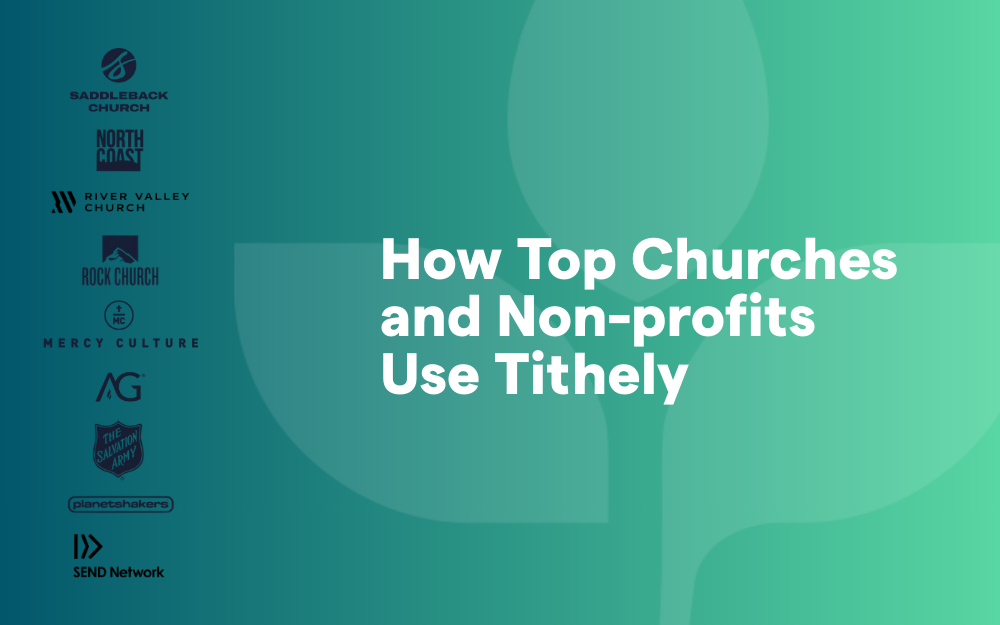Tithing: How Much to Donate to Church Weekly
Are Christians supposed to tithe? What even is a tithe and where did the common practice originate?

“Each of you should give what you have decided in your heart to give, not reluctantly or under compulsion, for God loves a cheerful giver” (2 Cor 9:7).
So you’re thinking of tithing to your church, huh? It helps to contextualize the why factor behind our cheerful giving if we set a Biblical precedent for financial generosity. Connecting our heart with our wallet helps make our tithe more joyous and Biblically grounded. Every time we give financially is an opportunity to be sacrificial and grow into the likeness of Jesus. So why tithe at church? Should the New Testament Christian tithe at all? Are the terms “tithe” and “giving” and “contribution” all the same, or are there key differences? Let’s find out.
Tithe: What, Why, When?
In the Old Testament of the Bible, “tithe” simply means “tenth”, and most commonly refers to giving a tenth of everything back to God, primarily as it pertains to agricultural assets and harvests.
The first instance of a tithe in scripture was when Abram (who is later named Abraham) gave “a tenth of everything” willingly and without prompting to the priest Melchizedek (Gen 14:20). Abram gave to Melchizedek as a sign of gratitude, and for recognition of Melchizedek’s greatness (Melchizedek was a priest, but not one descended from Aaron). Abram also gave in direct response to the great blessing Melchizedek bestowed on him.
In the New Testament book of Hebrews we discover that Jesus is now our Great High Priest, like Melchizedek. This New Testament call back to Old Testament tithing provides further illustration of why one might choose to prove their gratitude by giving away a tenth of what they have. Abram’s tithe (literally giving away a tenth) was before the Law of Moses was introduced. Abram gave truly from a place of gratitude and personal sacrifice. Likewise, we should give from a place of gratitude. Consider the blessings Christ bestowed upon us in his sacrifice on the cross. Christ’s act of generosity should become the catalyst for our own generosity.
The Old Testament practice of tithing was a main form of giving back to God what already belonged to him. “ ‘A tithe of everything from the land, whether grain from the soil or fruit from the trees, belongs to the LORD; it is holy to the LORD.” (Lev 27:30 NIV). Tithing, in this sense, was a way to recognize and appreciate that any agricultural asset was in fact God’s. Giving back to God was not to do a favor for the Lord, but rather to recognize that all things belonged to him in the first place.
God Loves a Cheerful Giver
So we know what tithing was in the Old Testament. But what does the Bible say about tithing in the New Testament? Are Christians called to tithe as well?
“Each of you should give what you have decided in your heart to give, not reluctantly or under compulsion, for God loves a cheerful giver” (2 Cor 9:7).
This tenet of Christian tithing (or more accurately, giving) in the New Testament might initially seem like a way out from giving away a tenth of everything. But that would be missing the point of this passage and others throughout the New Testament. The early church Christians gave far more than 10%. They gave everything!
Many sold their homes, shared all their belongings, and gave away their possessions to those in need (Acts 2:45). While 2 Corinthians 9:7 might initially appear to tell Christians that they don’t have to give a tenth of their income, a more accurate reading might be that Christians aren’t required to give only a tenth.
Give cheerfully, give joyfully. A tithe is 10%. But Christians under New Testament law are not bound to Old Testament law. So give as much as you’d like, even far and beyond a tithe! Give your money, give your time, give your heart. Be a giver to others just as Christ is a giver to you. Just as Christ gives generously, so should the Christ follower give generously.
A “Tithe” is a Good Starting Point
Giving generously and without compulsion was common practice for early Christians, and was certainly Jesus’ expectation for his disciples.
41 Jesus sat down opposite the place where the offerings were put and watched the crowd putting their money into the temple treasury. Many rich people threw in large amounts. 42 But a poor widow came and put in two very small copper coins, worth only a few cents.
43 Calling his disciples to him, Jesus said, “Truly I tell you, this poor widow has put more into the treasury than all the others. 44 They all gave out of their wealth; but she, out of her poverty, put in everything—all she had to live on” (Mark 12:41-44 NIV)
In this compelling story, Jesus was not so concerned with the amount of money that was given, but rather praised the widow’s holistic act of giving everything. Two coins don’t dent the piggy bank for those with much disposable income. But for the widow who had little, two copper coins was everything.
A helpful question to ask when you give: Is this a sacrifice for me? If giving a tithe to your church is something easy for you to do, try increasing your giving a little until it’s a sacrifice. After all, we give abundantly because we have been given in abundance. “Remember this: Whoever sows sparingly will also reap sparingly, and whoever sows generously will also reap generously” (2 Cor 9:6). Whether you tithe or give above and beyond, remember to contextualize your giving with scripture so your giving can become another avenue for being molded into the likeness of Christ.
Sign Up for Product Updates
“Each of you should give what you have decided in your heart to give, not reluctantly or under compulsion, for God loves a cheerful giver” (2 Cor 9:7).
So you’re thinking of tithing to your church, huh? It helps to contextualize the why factor behind our cheerful giving if we set a Biblical precedent for financial generosity. Connecting our heart with our wallet helps make our tithe more joyous and Biblically grounded. Every time we give financially is an opportunity to be sacrificial and grow into the likeness of Jesus. So why tithe at church? Should the New Testament Christian tithe at all? Are the terms “tithe” and “giving” and “contribution” all the same, or are there key differences? Let’s find out.
Tithe: What, Why, When?
In the Old Testament of the Bible, “tithe” simply means “tenth”, and most commonly refers to giving a tenth of everything back to God, primarily as it pertains to agricultural assets and harvests.
The first instance of a tithe in scripture was when Abram (who is later named Abraham) gave “a tenth of everything” willingly and without prompting to the priest Melchizedek (Gen 14:20). Abram gave to Melchizedek as a sign of gratitude, and for recognition of Melchizedek’s greatness (Melchizedek was a priest, but not one descended from Aaron). Abram also gave in direct response to the great blessing Melchizedek bestowed on him.
In the New Testament book of Hebrews we discover that Jesus is now our Great High Priest, like Melchizedek. This New Testament call back to Old Testament tithing provides further illustration of why one might choose to prove their gratitude by giving away a tenth of what they have. Abram’s tithe (literally giving away a tenth) was before the Law of Moses was introduced. Abram gave truly from a place of gratitude and personal sacrifice. Likewise, we should give from a place of gratitude. Consider the blessings Christ bestowed upon us in his sacrifice on the cross. Christ’s act of generosity should become the catalyst for our own generosity.
The Old Testament practice of tithing was a main form of giving back to God what already belonged to him. “ ‘A tithe of everything from the land, whether grain from the soil or fruit from the trees, belongs to the LORD; it is holy to the LORD.” (Lev 27:30 NIV). Tithing, in this sense, was a way to recognize and appreciate that any agricultural asset was in fact God’s. Giving back to God was not to do a favor for the Lord, but rather to recognize that all things belonged to him in the first place.
God Loves a Cheerful Giver
So we know what tithing was in the Old Testament. But what does the Bible say about tithing in the New Testament? Are Christians called to tithe as well?
“Each of you should give what you have decided in your heart to give, not reluctantly or under compulsion, for God loves a cheerful giver” (2 Cor 9:7).
This tenet of Christian tithing (or more accurately, giving) in the New Testament might initially seem like a way out from giving away a tenth of everything. But that would be missing the point of this passage and others throughout the New Testament. The early church Christians gave far more than 10%. They gave everything!
Many sold their homes, shared all their belongings, and gave away their possessions to those in need (Acts 2:45). While 2 Corinthians 9:7 might initially appear to tell Christians that they don’t have to give a tenth of their income, a more accurate reading might be that Christians aren’t required to give only a tenth.
Give cheerfully, give joyfully. A tithe is 10%. But Christians under New Testament law are not bound to Old Testament law. So give as much as you’d like, even far and beyond a tithe! Give your money, give your time, give your heart. Be a giver to others just as Christ is a giver to you. Just as Christ gives generously, so should the Christ follower give generously.
A “Tithe” is a Good Starting Point
Giving generously and without compulsion was common practice for early Christians, and was certainly Jesus’ expectation for his disciples.
41 Jesus sat down opposite the place where the offerings were put and watched the crowd putting their money into the temple treasury. Many rich people threw in large amounts. 42 But a poor widow came and put in two very small copper coins, worth only a few cents.
43 Calling his disciples to him, Jesus said, “Truly I tell you, this poor widow has put more into the treasury than all the others. 44 They all gave out of their wealth; but she, out of her poverty, put in everything—all she had to live on” (Mark 12:41-44 NIV)
In this compelling story, Jesus was not so concerned with the amount of money that was given, but rather praised the widow’s holistic act of giving everything. Two coins don’t dent the piggy bank for those with much disposable income. But for the widow who had little, two copper coins was everything.
A helpful question to ask when you give: Is this a sacrifice for me? If giving a tithe to your church is something easy for you to do, try increasing your giving a little until it’s a sacrifice. After all, we give abundantly because we have been given in abundance. “Remember this: Whoever sows sparingly will also reap sparingly, and whoever sows generously will also reap generously” (2 Cor 9:6). Whether you tithe or give above and beyond, remember to contextualize your giving with scripture so your giving can become another avenue for being molded into the likeness of Christ.
podcast transcript
“Each of you should give what you have decided in your heart to give, not reluctantly or under compulsion, for God loves a cheerful giver” (2 Cor 9:7).
So you’re thinking of tithing to your church, huh? It helps to contextualize the why factor behind our cheerful giving if we set a Biblical precedent for financial generosity. Connecting our heart with our wallet helps make our tithe more joyous and Biblically grounded. Every time we give financially is an opportunity to be sacrificial and grow into the likeness of Jesus. So why tithe at church? Should the New Testament Christian tithe at all? Are the terms “tithe” and “giving” and “contribution” all the same, or are there key differences? Let’s find out.
Tithe: What, Why, When?
In the Old Testament of the Bible, “tithe” simply means “tenth”, and most commonly refers to giving a tenth of everything back to God, primarily as it pertains to agricultural assets and harvests.
The first instance of a tithe in scripture was when Abram (who is later named Abraham) gave “a tenth of everything” willingly and without prompting to the priest Melchizedek (Gen 14:20). Abram gave to Melchizedek as a sign of gratitude, and for recognition of Melchizedek’s greatness (Melchizedek was a priest, but not one descended from Aaron). Abram also gave in direct response to the great blessing Melchizedek bestowed on him.
In the New Testament book of Hebrews we discover that Jesus is now our Great High Priest, like Melchizedek. This New Testament call back to Old Testament tithing provides further illustration of why one might choose to prove their gratitude by giving away a tenth of what they have. Abram’s tithe (literally giving away a tenth) was before the Law of Moses was introduced. Abram gave truly from a place of gratitude and personal sacrifice. Likewise, we should give from a place of gratitude. Consider the blessings Christ bestowed upon us in his sacrifice on the cross. Christ’s act of generosity should become the catalyst for our own generosity.
The Old Testament practice of tithing was a main form of giving back to God what already belonged to him. “ ‘A tithe of everything from the land, whether grain from the soil or fruit from the trees, belongs to the LORD; it is holy to the LORD.” (Lev 27:30 NIV). Tithing, in this sense, was a way to recognize and appreciate that any agricultural asset was in fact God’s. Giving back to God was not to do a favor for the Lord, but rather to recognize that all things belonged to him in the first place.
God Loves a Cheerful Giver
So we know what tithing was in the Old Testament. But what does the Bible say about tithing in the New Testament? Are Christians called to tithe as well?
“Each of you should give what you have decided in your heart to give, not reluctantly or under compulsion, for God loves a cheerful giver” (2 Cor 9:7).
This tenet of Christian tithing (or more accurately, giving) in the New Testament might initially seem like a way out from giving away a tenth of everything. But that would be missing the point of this passage and others throughout the New Testament. The early church Christians gave far more than 10%. They gave everything!
Many sold their homes, shared all their belongings, and gave away their possessions to those in need (Acts 2:45). While 2 Corinthians 9:7 might initially appear to tell Christians that they don’t have to give a tenth of their income, a more accurate reading might be that Christians aren’t required to give only a tenth.
Give cheerfully, give joyfully. A tithe is 10%. But Christians under New Testament law are not bound to Old Testament law. So give as much as you’d like, even far and beyond a tithe! Give your money, give your time, give your heart. Be a giver to others just as Christ is a giver to you. Just as Christ gives generously, so should the Christ follower give generously.
A “Tithe” is a Good Starting Point
Giving generously and without compulsion was common practice for early Christians, and was certainly Jesus’ expectation for his disciples.
41 Jesus sat down opposite the place where the offerings were put and watched the crowd putting their money into the temple treasury. Many rich people threw in large amounts. 42 But a poor widow came and put in two very small copper coins, worth only a few cents.
43 Calling his disciples to him, Jesus said, “Truly I tell you, this poor widow has put more into the treasury than all the others. 44 They all gave out of their wealth; but she, out of her poverty, put in everything—all she had to live on” (Mark 12:41-44 NIV)
In this compelling story, Jesus was not so concerned with the amount of money that was given, but rather praised the widow’s holistic act of giving everything. Two coins don’t dent the piggy bank for those with much disposable income. But for the widow who had little, two copper coins was everything.
A helpful question to ask when you give: Is this a sacrifice for me? If giving a tithe to your church is something easy for you to do, try increasing your giving a little until it’s a sacrifice. After all, we give abundantly because we have been given in abundance. “Remember this: Whoever sows sparingly will also reap sparingly, and whoever sows generously will also reap generously” (2 Cor 9:6). Whether you tithe or give above and beyond, remember to contextualize your giving with scripture so your giving can become another avenue for being molded into the likeness of Christ.
VIDEO transcript
“Each of you should give what you have decided in your heart to give, not reluctantly or under compulsion, for God loves a cheerful giver” (2 Cor 9:7).
So you’re thinking of tithing to your church, huh? It helps to contextualize the why factor behind our cheerful giving if we set a Biblical precedent for financial generosity. Connecting our heart with our wallet helps make our tithe more joyous and Biblically grounded. Every time we give financially is an opportunity to be sacrificial and grow into the likeness of Jesus. So why tithe at church? Should the New Testament Christian tithe at all? Are the terms “tithe” and “giving” and “contribution” all the same, or are there key differences? Let’s find out.
Tithe: What, Why, When?
In the Old Testament of the Bible, “tithe” simply means “tenth”, and most commonly refers to giving a tenth of everything back to God, primarily as it pertains to agricultural assets and harvests.
The first instance of a tithe in scripture was when Abram (who is later named Abraham) gave “a tenth of everything” willingly and without prompting to the priest Melchizedek (Gen 14:20). Abram gave to Melchizedek as a sign of gratitude, and for recognition of Melchizedek’s greatness (Melchizedek was a priest, but not one descended from Aaron). Abram also gave in direct response to the great blessing Melchizedek bestowed on him.
In the New Testament book of Hebrews we discover that Jesus is now our Great High Priest, like Melchizedek. This New Testament call back to Old Testament tithing provides further illustration of why one might choose to prove their gratitude by giving away a tenth of what they have. Abram’s tithe (literally giving away a tenth) was before the Law of Moses was introduced. Abram gave truly from a place of gratitude and personal sacrifice. Likewise, we should give from a place of gratitude. Consider the blessings Christ bestowed upon us in his sacrifice on the cross. Christ’s act of generosity should become the catalyst for our own generosity.
The Old Testament practice of tithing was a main form of giving back to God what already belonged to him. “ ‘A tithe of everything from the land, whether grain from the soil or fruit from the trees, belongs to the LORD; it is holy to the LORD.” (Lev 27:30 NIV). Tithing, in this sense, was a way to recognize and appreciate that any agricultural asset was in fact God’s. Giving back to God was not to do a favor for the Lord, but rather to recognize that all things belonged to him in the first place.
God Loves a Cheerful Giver
So we know what tithing was in the Old Testament. But what does the Bible say about tithing in the New Testament? Are Christians called to tithe as well?
“Each of you should give what you have decided in your heart to give, not reluctantly or under compulsion, for God loves a cheerful giver” (2 Cor 9:7).
This tenet of Christian tithing (or more accurately, giving) in the New Testament might initially seem like a way out from giving away a tenth of everything. But that would be missing the point of this passage and others throughout the New Testament. The early church Christians gave far more than 10%. They gave everything!
Many sold their homes, shared all their belongings, and gave away their possessions to those in need (Acts 2:45). While 2 Corinthians 9:7 might initially appear to tell Christians that they don’t have to give a tenth of their income, a more accurate reading might be that Christians aren’t required to give only a tenth.
Give cheerfully, give joyfully. A tithe is 10%. But Christians under New Testament law are not bound to Old Testament law. So give as much as you’d like, even far and beyond a tithe! Give your money, give your time, give your heart. Be a giver to others just as Christ is a giver to you. Just as Christ gives generously, so should the Christ follower give generously.
A “Tithe” is a Good Starting Point
Giving generously and without compulsion was common practice for early Christians, and was certainly Jesus’ expectation for his disciples.
41 Jesus sat down opposite the place where the offerings were put and watched the crowd putting their money into the temple treasury. Many rich people threw in large amounts. 42 But a poor widow came and put in two very small copper coins, worth only a few cents.
43 Calling his disciples to him, Jesus said, “Truly I tell you, this poor widow has put more into the treasury than all the others. 44 They all gave out of their wealth; but she, out of her poverty, put in everything—all she had to live on” (Mark 12:41-44 NIV)
In this compelling story, Jesus was not so concerned with the amount of money that was given, but rather praised the widow’s holistic act of giving everything. Two coins don’t dent the piggy bank for those with much disposable income. But for the widow who had little, two copper coins was everything.
A helpful question to ask when you give: Is this a sacrifice for me? If giving a tithe to your church is something easy for you to do, try increasing your giving a little until it’s a sacrifice. After all, we give abundantly because we have been given in abundance. “Remember this: Whoever sows sparingly will also reap sparingly, and whoever sows generously will also reap generously” (2 Cor 9:6). Whether you tithe or give above and beyond, remember to contextualize your giving with scripture so your giving can become another avenue for being molded into the likeness of Christ.




























